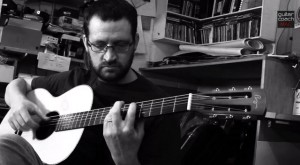Luthier Nick Benjamin is, in many ways, a true traditional artisan when it comes to making handmade, custom and individual guitars.
The label “limited edition” falls far short of describing what is produced in Nick’s small, one-man workshop in an old brewery in the town of Lewes, southeast England.
Armed with an engineering degree, Nick approaches guitar making like an engineer, as well as a musician and craftsman: “I think of myself as an engineer […] but the sound is an artistic choice.” Customers should find this combination assuring. He further explains that both “accuracy and quality is what I’m looking for in the way I’m building.”
According to Nick’s homepage, the historic town of Lewes “is unusual in the world of guitar making in that a small ‘community’ of makers exists here; each working separately but supporting one another and sharing ideas.” Nick averages around one guitar per month (though he makes six at once – you do the math!) and to date has only made about 130 instruments. Each of them unique.
Coming from a family of designers, engineers and musicians (his mother was a flautist), Nick built his first guitar, a classical model, in 1990 at the age of 17 in his bedroom at his parents’ house. After honing his skills on more classical as well as electric guitars, he moved on to steel stringed models, using what he had learned under the tutelage of two local guitar makers.
For those beginning guitar making, Nick explains that the traditional Spanish construction style can be an ideal starting point, due to its efficient style requiring few tools. The progression to modern methods of guitar construction generally involves the adoption of many specialist tools and fixtures: the steel-string guitar, in particular, requiring additional neck reinforcing inserts which necessitate at least some use of power tools.
Making six guitars at once, Nick finds, is the perfect method. “when I make six guitars they’re all different, but I do each process on all six at once. I actually find this improves the quality of the instruments.”
And who exactly is buying Benjamin guitars?
Nick’s customers are mostly keen amateur players in search of a different guitar with a unique sound, as well as professional guitarists who depend on simple, work-ready instruments of very high quality. Though authentic and traditional, the modern acoustic guitar needs to be able to be played anywhere from the living room to the arena stage, so Benjamin guitars are designed and built to be extremely compatible with amplification so that they sound great plugged in or fully acoustic. Besides standard steel string models, Nick offers baritones, twelve strings, Terz (smaller, higher tuned), nylon string guitars, Venetian cutaway and the signature “Benjamin Scoop” cutaway models, among others.
Why choose a unique, handmade guitar?
Nick is not trying to reach an exclusive or elite market, but instead offers a personal experience to his customers. Acquiring a Benjamin guitar is like going on a journey. There is the element of the unknown – not in terms of quality, but of precise characteristics. There is the anticipation, choosing the woods, model and decoration schemes, interacting with the maker – and that’s just the pleasure of the process. At the end the customer gets a beautiful guitar. “It’s a double sort of pleasure, if you like,” Nick explains. In an age of mass production and uniformity, he firmly believes that a musical instrument is something that can still be very personal. And what makes a guitar unique? The main differences lie in the choice of wood, instrument size, shape, features, etc., but all of Nick’s guitars sound like a Benjamin.
Some notes about wood use:
Luthiers are now being forced to use non traditional woods for guitar making, “a symptom of deforestation and the overuse of resources,” according to Nick. But these “newer” woods can be extremely close to traditional timbers in terms of sound and colour, as well as offer some great qualities of their own. American black walnut and cocobolo rosewood are some of Nick’s favourite additions to his arsenal of tropical rosewoods, ebonies and spruces. Sustainability, if you’ll pardon the obvious pun, is key to the future of acoustic guitar making.
Properties of the wood are crucial. An average acoustic guitar will have a soundboard made of a soft wood like spruce or cedar, which are light and strong timbers. The main body – the back and sides – should be strong and dense, providing weight and strength, making rosewood, mahogany and walnut ideal woods. Different weights of wood can be used to create different sounds, ranging from deep and dark to light and airy. The neck of the guitar needs to be strong and is usually mahogany due to its strength, stability, sound and the fact that it’s easy to carve, whereas the bridges and fingerboard have to be hard and are therefore usually ebony or sometimes rosewood.
Keep in mind when buying a custom ordered, unique handmade acoustic steel stringed Benjamin guitar you are paying for something special, personal and worth the wait. Nick’s prices start at £4,000 (the cost of materials plus a month’s skilled labour and workshop rental).
Fancy taking a journey?





